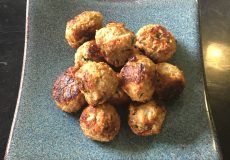A Holistic Guide to PCOS
PCOS, also known as Polycystic Ovarian Syndrome is a complex condition that can significantly affect a woman’s quality of life. One of the biggest ways it does this is by impacting on a women’s ability to conceive and maintain a pregnancy, but it can also impact a woman’s self-esteem by making it difficult to lose weight, it causes acne and hair issues, such as too much hair where a woman doesn’t want it to be, and potentially thinning of scalp hair.
Of course, there is more to it than that, but those are the major things that women report as the issues they’re most upset by.
In this article and podcast I will discuss the lack of awareness and poor understanding surrounding PCOS, how it is often misunderstood and why its name has a role in this. I discuss the common, and not so common signs and symptoms of PCOS and talk about the driving factors that can cause PCOS to develop. I talk about how PCOS is often diagnosed and discuss some of the key ways PCOS can be addressed naturally.
You can listen to this article on the podcast links below, or in the embedded player.

Understanding PCOS
Lack of awareness
Sadly, but not unexpectedly there is a lack of awareness and understanding of PCOS, with many people who have not been diagnosed not aware of the condition at all, but also women who have been diagnosed, and some health practitioners as well, not properly understanding the condition. A big part of this lack of awareness is the lack of research into the condition, but also I believe it is part of the bigger picture of gender bias in medicine, and many conditions that are specific to women do not have the attention they deserve, perhaps the exception being breast cancer. One of the other things that doesn’t help this lack of awareness and understanding is the name of the condition itself – polycystic ovarian syndrome.
The name makes a few false implications which cause overall confusion – so here are a few points I want you to know:
- The condition doesn’t originate in ovaries and the condition is not all about ovaries either, after menopause, the condition can persist. It is more of a metabolic condition, with systemic high androgens and insulin resistance being the core drivers.
- A PCOS ovary doesn’t actually have ‘cysts’, rather what you can see on ultrasound is immature follicles. Follicles are the little sacks that your oocyte, or eggs sit in waiting for the hormones from the brain to tell it to mature and then ovulate. The issue is these follicles in PCOS is they aren’t developing properly, so if we got them to develop fully these so-called cysts would be a baby (if met with a sperm).
A new name?
Many physicians and researchers have proposed a name change for PCOS, however, that was being proposed in 2013 and it’s 2020, so who knows when that will happen. I agree the condition does need a name change, as I feel PCOS is not a good representation. One of the names suggested which I like is ‘metabolic reproductive syndrome’, however other names suggested were Poly-follicular ovarian syndrome with metabolic dysfunction and/or hyperandrogenic manifestations (PFOS-MD and/or -HM).
The list of potential signs and symptoms is long for PCOS, which explains why there are so many women out there that don’t know why they have the symptoms they do.
PCOS Symptoms
Most common symptoms of PCOS include:
- Irregular periods or absent periods
- Acne
- Weight gain
- Excessive hair growth, also known as hirsutism. This can vary in locations and intensity and it will also be different dependant on your nationality.
Less well known, but still common symptoms:
- Anxiety and/or depression
- Fatigue
- Brain fog
- Skin tags
- dark patches on the skin
- low libido
- Sleep disturbances and snoring (Sleep apnoea can also be more common due to the higher level of androgens. Poor sleep can worsen PCOS by worsening insulin resistance.)

And more than that, there are other complications, especially regarding fertility and baby’s health. The higher levels of androgens can increase the risk of miscarriage and are also linked with some increased risk for baby such as higher birth weight. Women with PCOS also tend to have difficulty with breastfeeding and a higher risk of diabetes after birth.
Thankfully, many of these risks are modifiable by correcting the underlying causes of PCOS, which I will discuss later.
Causes of PCOS – How does the switch get turned on
There are different ways PCOS can express, and for these different subtypes, there are different causes.
The main cause is insulin resistance, which causes the male hormones androgens to become high. Insulin, when it is too high, can trigger more production of testosterone, but it can also lower the amount of SHBG (sex hormone-binding globulin) which means our bodies can’t bind up the excessive testosterone as well, and so more is circulating our body, causing the symptoms of PCOS such as acne and hair issues. Insulin excess also affects our FSH : LH ratio which is important for ovulation, and high testosterone stops our follicles from maturing completely, so this means woman’s ability to ovulate is affected, and if that is affected their chances of conceiving is reduced, and oestrogen and progesterone balance is also affected.
There are different types of androgens, such as testosterone, DHEA and androstenedione, and depending on which one is elevated we can get an idea of what is driving your PCOS. For instance, if DHEA is high, we know that stress is a big driver.
It is also possible to have PCOS without insulin resistance and this is typically due to inflammation. this is a much rarer subtype, but certainly something to consider.
Something else to consider is your gut health can play a role in both hormone balance and metabolism. Your gut bacteria are responsible for so many things in the body, and if you’ve listened to my previous podcasts or read some of my other blog posts you’ll know that your microbiome is of vital importance in improving health. How does it affect PCOS? Well, if your microbiome is out of balance it can affect your metabolism, which can worsen insulin resistance. And an out of balance microbiome can also cause hormone problems, by allowing more of your ‘bad’ hormone metabolites to cycle back through the body.
Why do you have a PCOS ‘switch’ in the first place?
We know there is a genetic component to it, and there is some possibility that your genetic likelihood can be influenced by exposure to endocrine-disrupting chemicals in past generations, substances that are passed through generations. So effectively, what chemicals and diet your Grandmother was exposed to will impact your risk for PCOS.
This transgenerational effect has been demonstrated in animal studies when mice were fed an obesogenic diet and were given substances that mimic a high androgen state to bring about a metabolic state of PCOS, and it was found that their subsequent generations also expressed this condition.
It was also found that women with PCOS had levels of chemicals in their system that were not in use anymore and was found to have been passed through in utero from their mothers and grandmothers.
These chemicals are increasing the activity of the androgens and also acting as obesogens, contributing to the weight gain and insulin resistance.
Diagnosis issues
So how common is PCOS? The prevalence is about 8-13%, effectively 1 in 10 women. But it is a condition that is it is both over-diagnosed in young girls, and under-diagnosed in older women.
One of the issues in getting diagnosed is that there isn’t one specific diagnostic criteria, so you can get mixed messages.

Three main diagnostic criteria exist- the National Institutes of Health, the Rotterdam criteria and the Androgen Excess Society criteria.
All of the criteria require all other possible endocrine disorders to be excluded.
My criteria of choice is the Rotterdam diagnostic criteria. It requires a female to have two of these three criteria:
- Irregular periods
- Clinical and/or biochemical hyperandrogenism
- “Polycystic ovaries”
Many young girls are being prematurely diagnosed with PCOS. But it is normal for young girls to present with some symptoms of PCOS and this often resolves in a few years without intervention. It can take 3-6 years for a menstrual cycle to regulate itself, however if there is early intervention this can prolong this process, and it is thought that the most common recommendation given at this time – the oral contraceptive pill (OCP) can worsen insulin resistance, which perpetuates the condition.
What are the other causes that need to be excluded?
This could be conditions such as Cushing’s, Adrenal tumours or congenital adrenal hyperplasia. Screening would include blood tests for TSH, prolactin, FSH and anything else your practitioner feels warranted based on your signs and symptoms.
PCOS and Teens
Getting back to teenage girls and their periods, it’s not uncommon for girls to have irregular periods when they’re young, and this will usually regulate itself within 6 years. My personal preference in clinic is to not interfere with hormones in young girls but to allow their bodies to regulate themselves. If hormones are interfered with too early, then it will typically delay the regulation until later. This is relevant to not just herbs, but especially to things such as hormonal contraceptives.
A common understanding is that women with PCOS literally have cysts on their ovaries. But this isn’t the case, as the name implies. the polycystic ovarian appearance that some (but important to note, not all) women have on ultrasound is actually a higher count of immature eggs within their follicles. These eggs aren’t getting the signal from the brain to mature further, triggering ovulation and release.
If you can remember the diagnostic criteria, the presence of 2 of the 3 criteria is what it takes to get diagnosed, so if a woman has irregular periods and signs of high androgens, she can have PCOS without the presences of any ‘cysts’ on her ovaries at all.
A more positive perspective.
One of the perspectives I have heard before about PCOS which I love is that this is an evolutionary trait which in years gone by was protective. if you consider that being pregnant and giving birth was a life-threatening thing at worst, and a depleting event at best, it can make sense why a condition like PCOS which can reduce one’s fertility may be protective in tough times. Insulin resistance is beneficial in times of scarcity as it allows you to store more of the energy from foods, which in famine times if beneficial. In times of plenty such as now, this, unfortunately, works against us. In a time without contraception, women may have gone from one baby to the next without a break, which can be quite a high level of stress and depletion. So, for women with PCOS who have longer times between ovulation, and so fewer opportunities to conceive, this could be considered a positive thing. Nowadays this might not be much comfort especially if you’re wanting to conceive, but I believe anytime you can view your health from more a positive light it is beneficial, so ladies with PCOS you might like to shift your frame of thinking to more of an ‘I’m a survivor’ mindset.
Other considerations for PCOS
Sleep
Sleep disturbances are reported to be twice as likely for women with PCOS. Studies show found that women with PCOS are more likely to report difficulty falling asleep, to have restless sleep occasionally and often feel severely tired. Sleep problems also occurred in women with PCOS who were in the normal weight range.
It’s still unclear how PCOS affects sleep but we know that the metabolic impacts of the condition play a big role. The hormones melatonin and cortisol are responsible for our sleep cycles to a large degree and these are strongly influenced by insulin resistance and elevated testosterone, as well as the stress placed on the body if obese.
Sleep apnoea is also often reported in women with PCOS, more often in those who are overweight. In those people who are considered to be ‘severely obese’, (BMI >40kg/m2) the prevalence of sleep apnoea in both men and women can be as high as 92%.
The mental health impacts of PCOS which is an increase of anxiety and depression have a bidirectional association with poor sleep quality and insomnia.
Weight loss and exercise is one of the best ways to improve sleep quality in women with PCOS, and if needed there are herbal medicines which can be of support.
Nutrients such as magnesium and calcium and the amino acid l-theanine can also be supportive to calm the nervous system and promote relaxation and sleep.
PCOS and Mental Health
Women with PCOS have higher rates of anxiety and depression. PCOS can be a very distressing condition for many women and this varies from person to person, with some of the highest reported contributors to the anxiety and depression is the impact to fertility, the impact on physical appearance and self-esteem such as weight issues, hirsutism and acne, and also the frustration about the lack of a clear cut solution, and a lack of awareness and understanding of the condition. There was a study that found that women with PCOS were physically active reported less depression and anxiety than those who were inactive. So, while I love to use herbal medicines to support mood and the nervous system, I do frequently recommend exercise to support mood in women with PCOS.
Potential pregnancy risks
There are a few things to consider when trying to conceive, as women with PCOS have an increased risk of some complications during pregnancy. The good news is that if PCOS has been treated, these risks return to almost the same levels as women who do not have PCOS. The risks include an increased likelihood of developing gestational diabetes, pregnancy-induced hypertension and preterm birth, and an increased risk of neonatal complications.
The increase in birth weight of babies born to women with PCOS also suggests an increased likelihood of c-section deliveries.
The treatment used in the study I mentioned before was anti-androgenic therapy, which means correcting hormonal balance before conceiving will improve pregnancy outcomes.
one small study looked at the incidence of gestational diabetes in women with PCOS and found the prevalence was 30.2%, and that these women had impaired blood sugar levels after having their babies. What we can take from this is that PCOS can have a long term impact on glucose metabolism, and again it highlights how important it is to try and take steps to improve your hormones and blood sugar level balance before conceiving.
I recommend that all couples do a preconception care program before conceiving, which at a minimum entails taking a high quality preconception care nutrient complex for 3-4 months before conceiving but if there are hormonal imbalances its important to work on this with a practitioner before trying to conceive.
Complications with breastfeeding
A lesser-known complication with PCOS is that it can cause some difficulties with breastfeeding and milk supply – however, this can also be supported by working on hormones before pregnancy, and with the support of a lactation consultant after birth. Thankfully not all women with PCOS experience difficulties breastfeeding and the information that says it is potentially problematic is only based on small studies. In the research that we do have available, the breastfeeding difficulties were only experienced in the first 3 months and seemed to regulate after that time.
Breastfeeding requires the hormones prolactin and oxytocin to work properly, but we also need adequate progesterone during pregnancy for the breast tissue to develop properly. Insulin resistance and high androgens can affect hormones in all these aspects.
How to manage PCOS
There are so many options for treating PCOS, and as it usually the case with naturopathic remedies, you get the best results when you are treated holistically. This means considering various things like what exactly is happening with your PCOS subtype.
The information I am giving you is a starting point to take to your practitioner to discuss whether it is right for you and to give you hope that there are so many possibilities to help.
while there have not been studies finding some remedies that tend to be universally helpful for most PCOS sub-types, and one of that does seem to be of great benefit is the amino acid Inositol. Taking 2g twice a day is my recommended dose for this.
Diet and lifestyle changes are great for treating insulin resistance, and while it’s tricky to find research specifically for this in PCOS we know it helps address the cause.
I recommend 150 minutes of exercise a week, which can be split into small blocks of exercise such as 30 minutes 5 times a week, or larger chunks such as 50 minutes three times a week. Eating a low GI/GL diet is also very important to address insulin resistance, and having a diet rich in antioxidants and low in inflammatory foods is also very helpful.
If you are overweight and have PCOS, then aiming to lose 5-10% of your body weight is a fantastic goal, and this amount seems to be the magic number that improves fertility rates and reduces risks for diabetes. Losing weight ideally would be done through a combination of diet and exercise.
Nutrients such as magnesium, b vitamins, particularly activated B vitamins, vitamin D and chromium can also be helpful.
Omega-3 fatty acids such as fish oil or algae oil can also help with some of the components of PCOS such as high cholesterol and inflammation.
Other herbs that I would consider is Berberine containing herbs such as Phelledendron which helps with improving insulin resistance and regulates blood lipid levels. There is also evidence showing that Black Cohosh can be helpful alongside other PCOS treatment.
The combination of Peony and Licorice has been looked at in Chinese medicine studies, and this is still a good inclusion in treatment, depending on the individual. Bulgarian Tribulus can also be helpful to regulate ovulation.
Spearmint can be helpful to reduce excessive androgens. I like this when used in a tea and is why I included it in one of my tea blends that supports skin health, to address this aspect.
Supporting gut health is also very important, as a poor microbiome can impair metabolism and worsen inflammation. So eating a diet rich in vegetables with lots of diversity is fantastic for improving the flora diversity in the gut, but it can also be helpful to take probiotics or prebiotics, so discuss this with your practitioner to make sure you’ve got the right type for you.
References
Bahri Khomami, M., Boyle, J. A., Tay, C. T., Vanky, E., Teede, H. J., Joham, A. E., & Moran, L. J. (2018). Polycystic ovary syndrome and adverse pregnancy outcomes: Current state of knowledge, challenges and potential implications for practice. Clinical Endocrinology, 88(6), 761-769. https://doi.org/10.1111/cen.13579
Bahri Khomami, M, Joham, AE, Boyle, JA, et al. Increased maternal pregnancy complications in polycystic ovary syndrome appear to be independent of obesity—A systematic review, meta‐analysis, and meta‐regression. Obesity Reviews. 2019; 20: 659– 674. https://doi.org/10.1111/obr.12829
Fernandez, R. C., Moore, V. M., Van Ryswyk, E. M., Varcoe, T. J., Rodgers, R. J., March, W. A., Moran, L. J., Avery, J. C., McEvoy, R. D., & Davies, M. J. (2018). Sleep disturbances in women with polycystic ovary syndrome: prevalence, pathophysiology, impact and management strategies. Nature and science of sleep, 10, 45–64. https://doi.org/10.2147/NSS.S127475
Guerrero-Bosagna C, Weeks S, Skinner MK (2014) Identification of Genomic Features in Environmentally Induced Epigenetic Transgenerational Inherited Sperm Epimutations. PLOS ONE 9(6): e100194. https://doi.org/10.1371/journal.pone.0100194
Guo Z, Qiu H, Wang L, et al. Association of serum organochlorine pesticides concentrations with reproductive hormone levels and polycystic ovary syndrome in a Chinese population. Chemosphere. 2017 Mar;171:595-600. DOI: 10.1016/j.chemosphere.2016.12.127.
Holton, S., Papanikolaou, V., Hammarberg, K., Rowe, H., Kirkman, M., Jordan, L., McNamee, K., Bayly, C., McBain, J., Sinnott, V., & Fisher, J. (2018). Fertility management experiences of women with polycystic ovary syndrome in Australia. European Journal of Contraception and Reproductive Health Care, 23(4), 282-287. https://doi.org/10.1080/13625187.2018.1483020
Mo L, Mansfield DR, Joham A, et al. Sleep disturbances in women with and without polycystic ovary syndrome in an Australian national cohort [published online December 26, 2018]. Clin Endocrinol (Oxf). doi:10.1111/cen.13922
Rosenwaks, Z. (2017). Polycystic ovary syndrome, an enigmatic syndrome begging for a name change. Fertility and Sterility, 108(5), 748–749. https://doi.org/10.1016/j.fertnstert.2017.09.030













